新概念英语第二册复习笔记 第四课 课文讲解
裕兴新概念英语第二册Lesson4第4课笔记讲义
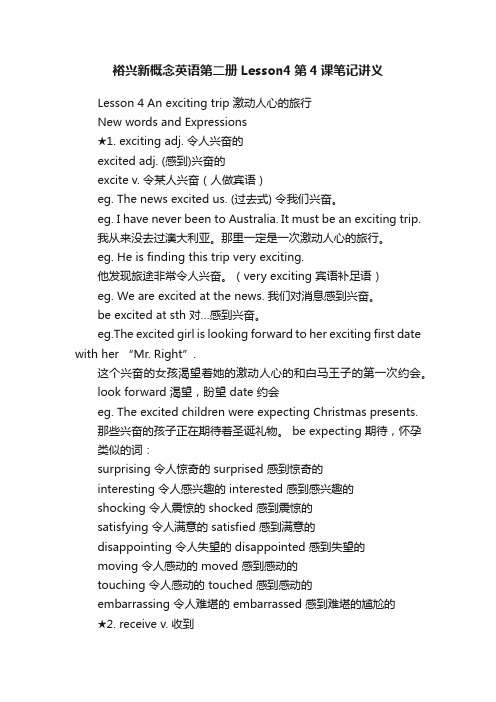
裕兴新概念英语第二册Lesson4第4课笔记讲义Lesson 4 An exciting trip 激动人心的旅行New words and Expressions★1. exciting adj. 令人兴奋的excited adj. (感到)兴奋的excite v. 令某人兴奋(人做宾语)eg. The news excited us. (过去式) 令我们兴奋。
eg. I have never been to Australia. It must be an exciting trip.我从来没去过澳大利亚。
那里一定是一次激动人心的旅行。
eg. He is finding this trip very exciting.他发现旅途非常令人兴奋。
(very exciting 宾语补足语)eg. We are excited at the news. 我们对消息感到兴奋。
be excited at sth 对…感到兴奋。
eg.The excited girl is looking forward to her exciting first date with her “Mr. Right”.这个兴奋的女孩渴望着她的激动人心的和白马王子的第一次约会。
look forward 渴望,盼望 date 约会eg. The excited children were expecting Christmas presents.那些兴奋的孩子正在期待着圣诞礼物。
be expecting 期待,怀孕类似的词:surprising 令人惊奇的 surprised 感到惊奇的interesting 令人感兴趣的 interested 感到感兴趣的shocking 令人震惊的 shocked 感到震惊的satisfying 令人满意的 satisfied 感到满意的disappointing 令人失望的 disappointed 感到失望的moving 令人感动的 moved 感到感动的touching 令人感动的 touched 感到感动的embarrassing 令人难堪的 embarrassed 感到难堪的尴尬的★2. rec eive v. 收到receive sth from sb 从谁那收到什么东西receive a letter 收到一封信 receive a present 收到一份礼物receive a phone call 接到一个电话 receive good education 得到良好的教育eg. You will receive a warm welcome whenever you come to my home.无论你什么时候来我们家你都会得到热烈欢迎的。
新概念英语第二册lesson 4

SPECIAL DIFFICULTIES 难点
本课难点:易混淆的词 receive, take Receive 是“收到”,指的是一个被动的动作,主观 上接受与否不清楚。常与from连用,如 receive a letter from sb. Take 则是主动的“拿,取”,常与with, to, off, out of 连用,如 take the book with me, take the coat off, take the flowers to his wife
《新概念英语第二册》 LESSON 4
NEW WORDS AND EXPRESSIONS 生词和短语
Exciting adj. 令人兴奋的
Eg:an exciting trip 令人兴奋的旅行 Excited adj. 自己感到兴奋的 Eg:the news is exciting, I’m excited. -ing: 令人感到,主语是物 -ed: 自己 感到,主语是人
Receive (在难点部分讲解) Firm n. 商行,公司
Company 公司
Different adj. 不同的
Be different from: 与…不同
Centre n. 中心
In th
adv. 在国外
Go abroad 去国外 Live abroad 在国外居住 Study abroad 在国外求学
NOTES ON THE TEXT 课文注释
A great number of : 许多…,修饰可数名词复数
A great amount of : 许多…, 修饰不可数名词 Plenty of : 许多…, 修饰不可数名词 A lot of :许多…, 修饰可数或不可数名词
新概念英语第二册 lesson 4 笔记和答案
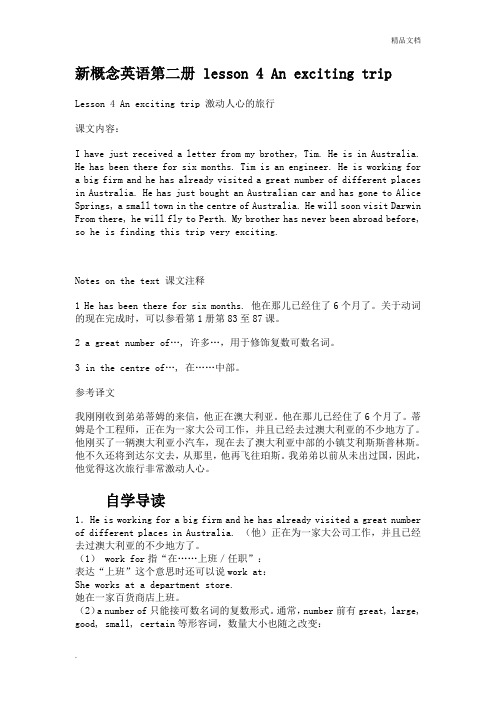
新概念英语第二册 lesson 4 An exciting trip Lesson 4 An exciting trip 激动人心的旅行课文内容:I have just received a letter from my brother, Tim. He is in Australia. He has been there for six months. Tim is an engineer. He is working for a big firm and he has already visited a great number of different places in Australia. He has just bought an Australian car and has gone to Alice Springs, a small town in the centre of Australia. He will soon visit Darwin From there, he will fly to Perth. My brother has never been abroad before, so he is finding this trip very exciting.Notes on the text 课文注释1 He has been there for six months. 他在那儿已经住了6个月了。
关于动词的现在完成时,可以参看第1册第83至87课。
2 a great number of…, 许多…,用于修饰复数可数名词。
3 in the centre of…, 在……中部。
参考译文我刚刚收到弟弟蒂姆的来信,他正在澳大利亚。
他在那儿已经住了6个月了。
蒂姆是个工程师,正在为一家大公司工作,并且已经去过澳大利亚的不少地方了。
他刚买了一辆澳大利亚小汽车,现在去了澳大利亚中部的小镇艾利斯斯普林斯。
新概念英语第二册笔记之Lesson 4.doc

新概念英语第二册笔记之Lesson 4新概念英语第二册笔记之Lesson4§Lesson4Anexcitingtrip激动人心的旅行【Newwordsandexpressions】生词和短语★excitingadj.令人兴奋的excite:激动excited:-ed:自己感到/-ing:令人感到excitingboy令人兴奋的男孩interestingmanThemanisinteresting.Thenewsexciting,Iamexcited这类动词的宾语一定是人Thenewsexcitedme.让后面的人感到...interesting:令人感到有趣的interested:感到有意思的Thebookinterestsme.那本事让我感到很有趣★receivev.接受,收到accept:同意接收receive:客观的收到ThismorningIreceivedabunchofflowersfr omaboy,butIdidn’tacceptit.take也可以作收到taketheexam:接收考试;takeadvice接收建议receive/havereceive/havealetterfromsomebody.★firmn.商行,公司company★differentadj.不同的★centren.中心★abroadadv.在国外副词,直接和动词连用goaroad去国外liveabroad国外定居studyabroad国外学习【Text】Lesson4?Anexcitingtrip?激动人心的旅行Firstlistenandthenanswerthequestion.听录音,然后回答以下问题.WhyisTimfindingthistripexciting?Ihavejustreceivedaletterfrommybrother,Tim.HeisinAustralia.Hehasbeenth ereforsixmonths.Timisanengineer.Heisworkingforabigfirmandhehasalread yvisitedagreatnumberofdifferentplacesinAustralia.HehasjustboughtanAus traliancarandhasgonetoAlicesprings,asmalltowninthecentreofAustralia.He willsoonvisitDarwin.Fromthere,hewillflytoPerth.Mybrotherhasneverbeenabroadbefore,soheisfendingthistripveryexciting.参考译文我刚刚收到弟弟蒂姆的来信,他正在澳大利亚.他在那儿已经住了6个月了.蒂姆是个工程师,正在一家大公司工作,并且已经去过澳大利亚的不少地方了.他刚买了一辆澳大利亚小汽车,现在去了澳大利亚中部的小镇艾利斯斯普林斯.他不久还将到达达尔文去,从那里,他再飞往珀斯.我弟弟以前从未出过国,因此,他觉得这次旅行非常激动人心.【课文讲解】读音语调要顿拙一些receivedaletterfromjust和完成时连用monthsonemonth[????]twomonths[?????]注意读音将/?/省略I’havearrivedinBeijing.arrive是瞬间动词不能和段时间连用HehasbeeninBeijingforoneyear.hasbeen+in地点HehasbeeninAmericafortowyears.连读workforworkin强调地点workfor强调workIamworkingforaschool.IamworkingintheNewOrientalschool.agreatnumberof类似于,约等于alotofagreatnumberof后面一定要加可数名词复数alotof可加可数名词也可加不可数名词IhavealotoffriendsIhaveagreatnumberoffriends.hasgoneto:去了某地没回来hasbeento:曾经去过某地,现在不在那个地方HaveyoubeentoParis?soon:很快fromthere:从那地方起from即可以加时间又可以加地点fromhalfpast8tohalfpast11fromBeijingtoTianjingflytoPerth:gotoPerthbyairbefore——副词,在此之前现在完成时态的标志findtripexcitingfind+宾语+形容词做宾补findtheroomcleanfindherhappyisfindingI’mfinding.....We’refinding......在口语中经常使用〖语法精粹〗P4下面表示状态、感觉、情绪、精神活动的动词不可用于进行时believe;doubtseehearknowunderstandbelongthink considerfeellookseemshowmindhavesoundtaste requirepossesscarelikehatelovedetestdesirearrive不能和断时间连用用进行时态表示将来时态的:go,come,leave,arrive第3课关键句型:一般过去式第4课关键句型:现在完成式第5课:一般过去式和现在完成式的相同点,不同点,用的时候要注意什么下面几个词一出现就标志着完成式:justbeforealreadyreceivetake他到某地有多久了.Hehasbeen......Ihavebeenhereforthreeyears.find:发现,找到findthebookdirtyfind+n.+a.【Multiplechoicequestions】多项选择题3?TimisinAustralia.Hewent______Australiasixmonthsago.a.tob.inc.atd.intoat...表示位置beat...goto...只要有to这个感念,它的后面一定要有宾语,gotothetheater goin...很少加宾语Hewentin.gointo...有去向的动作,还有进入的动作gointotheroommove:搬家movein:搬进来movetothenewhouse:正在搬moveinto:搬进去了4?TimisinAustralia.Howlong______there? a.isheb.hashebeenc.hashed.washe howlong...对段时间提问,跟现在完成时相连have+动词的过去分词。
新概念英语第二册第四课课文详解
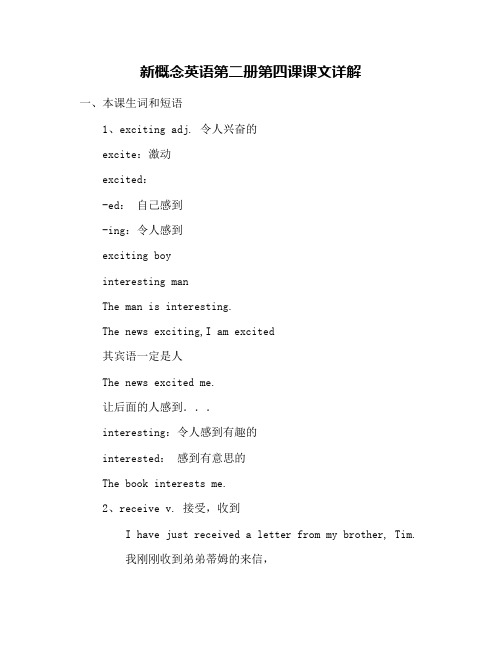
新概念英语第二册第四课课文详解一、本课生词和短语1、exciting adj. 令人兴奋的excite:激动excited:-ed:自己感到-ing:令人感到exciting boyinteresting manThe man is interesting.The news exciting,I am excited其宾语一定是人The news excited me.让后面的人感到...interesting:令人感到有趣的interested:感到有意思的The book interests me.2、receive v. 接受,收到I have just received a letter from my brother, Tim.我刚刚收到弟弟蒂姆的来信,receive[ri5si:v]vt.收到, 接到, 接收(receive的过去式和过去分词是received)re-前缀,表"又,重新"的意思。
Receive/ accept/和take的区别:accept:同意接收receive:客观的收到take take the exam:接收考试; take advice接收建议This morning I received a bunch of flowers from aboy,but I didn't acceptit.take take the exam:接收考试; take advice接收建议receive/havereceive/have a letter from somebody.3、firm n. 商行,公司Companyfirm 主要用在非正式场合和口语,Company 是公司的正式称呼。
4、abroad adv. 在国外副词,直接和动词连用go aroadlive abroadstudy abroad5、so he is finding this trip very exciting.所以,他觉得这次旅行非常激动人心。
裕兴 新概念英语 第二册 Lesson 4 第4课 笔记讲义
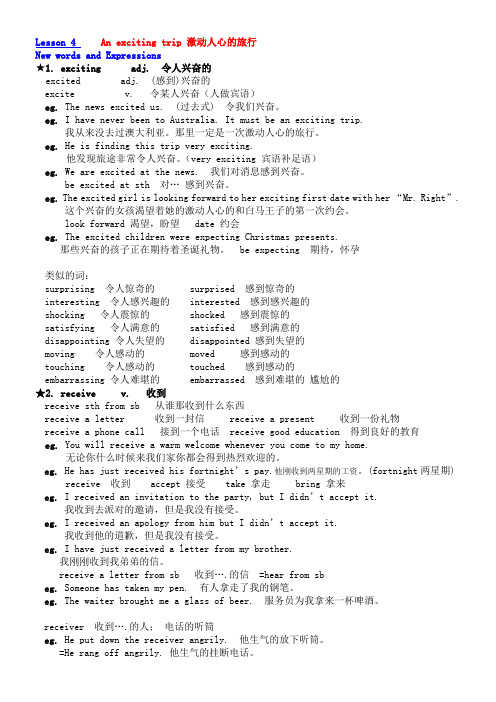
Lesson 4 An exciting trip 激动人心的旅行New words and Expressions★1. exciting adj. 令人兴奋的excited adj. (感到)兴奋的excite v. 令某人兴奋(人做宾语)eg. The news excited us. (过去式) 令我们兴奋。
eg. I have never been to Australia. It must be an exciting trip.我从来没去过澳大利亚。
那里一定是一次激动人心的旅行。
eg. He is finding this trip very exciting.他发现旅途非常令人兴奋。
(very exciting 宾语补足语)eg. We are excited at the news. 我们对消息感到兴奋。
be excited at sth 对…感到兴奋。
eg.The excited girl is looking forward to her exciting first date with her “Mr. Right”.这个兴奋的女孩渴望着她的激动人心的和白马王子的第一次约会。
look forward 渴望,盼望 date 约会eg. The excited children were expecting Christmas presents.那些兴奋的孩子正在期待着圣诞礼物。
be expecting 期待,怀孕类似的词:surprising 令人惊奇的 surprised 感到惊奇的interesting 令人感兴趣的 interested 感到感兴趣的shocking 令人震惊的 shocked 感到震惊的satisfying 令人满意的 satisfied 感到满意的disappointing 令人失望的 disappointed 感到失望的moving 令人感动的 moved 感到感动的touching 令人感动的 touched 感到感动的embarrassing 令人难堪的 embarrassed 感到难堪的尴尬的★2. receive v. 收到receive sth from sb 从谁那收到什么东西receive a letter 收到一封信 receive a present 收到一份礼物receive a phone call 接到一个电话 receive good education 得到良好的教育eg. You will receive a warm welcome whenever you come to my home.无论你什么时候来我们家你都会得到热烈欢迎的。
新概念英语第二册:第4课课文详解及语法解析
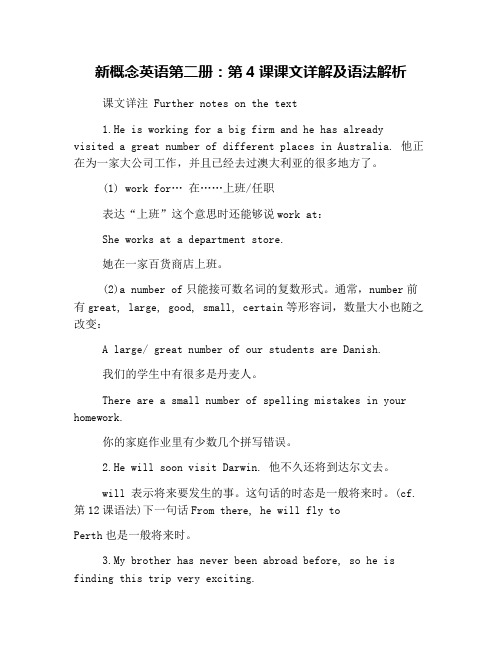
新概念英语第二册:第4课课文详解及语法解析课文详注 Further notes on the text1.He is working for a big firm and he has already visited a great number of different places in Australia. 他正在为一家大公司工作,并且已经去过澳大利亚的很多地方了。
(1) work for… 在……上班/任职表达“上班”这个意思时还能够说work at:She works at a department store.她在一家百货商店上班。
(2)a number of只能接可数名词的复数形式。
通常,number前有great, large, good, small, certain等形容词,数量大小也随之改变:A large/ great number of our students are Danish.我们的学生中有很多是丹麦人。
There are a small number of spelling mistakes in your homework.你的家庭作业里有少数几个拼写错误。
2.He will soon visit Darwin. 他不久还将到达尔文去。
will 表示将来要发生的事。
这句话的时态是一般将来时。
(cf. 第12课语法)下一句话From there, he will fly toPerth也是一般将来时。
3.My brother has never been abroad before, so he is finding this trip very exciting.我弟弟以前从未出过国,所以,他觉得这次旅行非常激动人心。
(1)这句话由两个简单句组成,后一句由连词so引导,为表示结果的状语从句。
(2)find作“发现”、“发觉”讲时宾语往往带补足语(一般为形容词),说明宾语的状况、性质等:I find the film very interesting.我觉得这电影很有趣。
新概念英语第二册第四课完整版教案

Lesson 4 An exciting tripNew Words and Expressions1. exciting: creating or arousing excitement ;令人兴奋的What exciting news this is! 这是多么令人兴奋的消息!That is an exciting game. 那是一场令人兴奋的比赛。
It's such an exciting place. 真是一个令人兴奋的地方。
This is a very exciting book. 这是一本非常扣人心弦的书。
2. receive: 接受;收到receive an invitation[a letter]from sb 接到某人的邀请函[信]receive a sick person into a hospital 把病人收进医院receive guests warmly 热烈欢迎客人Did you receive any letters today? 你今天收到信了吗?The police received several complaints about the noise from the plant. 警察局收到好几宗投诉, 抱怨工厂的噪音太大。
区别用法:receive, accept, take这三个词都有“接受”的意思。
receive只表示被动地接受Then he smiled and told me I would receive an extra £100 a year! 后来他笑了,并且告诉我说,我将一年收到一百英镑的额外收入!If you receive a request like this, you cannot fail to obey it! 如果你收到这样的一种请求,你不会不服从的!A baby can only receive sense impressions, but it can not understand them. 婴儿只能接受感官方面的印象,而不能理解。
- 1、下载文档前请自行甄别文档内容的完整性,平台不提供额外的编辑、内容补充、找答案等附加服务。
- 2、"仅部分预览"的文档,不可在线预览部分如存在完整性等问题,可反馈申请退款(可完整预览的文档不适用该条件!)。
- 3、如文档侵犯您的权益,请联系客服反馈,我们会尽快为您处理(人工客服工作时间:9:00-18:30)。
新概念英语第二册复习笔记第四课课文讲解
just 搭配现在完成时
receive a letter from sb 相当于hear from sb 收到……来信
write to sb 给…..写信
Australia n.澳大利亚Australian adj. 澳大利亚的
Italy n. 意大利Italian n. 意大利语
for six months
He went there six months ago. 半年前他去那儿了。
He has been there since six months ago. 自从半年前他就去哪儿了。
He has been there for six months. 他已经在哪儿半年了。
for + 一段时间
since + 时间的一点
engineer n. 工程师,建筑师,机械师,火车司机
engine n. 发动机;引擎,机车,火车头
a steam engine 蒸汽机车
engine-driver (Br) 火车司机
engineer (U.S) 火车司机
a number of + n.( pl.) + are……许多的,大量的
eg. A large number of books are stolen. 大量的书籍被盗。
The number of + n.( pl.) + is….. ……的数量是
eg. The number of stolen books is 25. 被偷的书的数目是25本。
eg. A number of people apply for this job. 许多人申请这份工作。
eg. The number of applicants is 70. 申请者的数目是70人。
number n. 号码,数字,数目
eg. My telephone number is 6229897. 我的电话号码是6229897.
No. ( short term 缩略形式)
eg. The company is No. One in the oil business. 这家公司在石油领域是最棒的。
eg. There is safety in numbers. 人多势众。
bought : buy-bought-bought sell-sold-sold bring-brought-brought
have gone to 去了……have been to 去过……
eg. where is Jackson? Jachson去哪儿了?
He has gone to Canada, and he has been there a great number of times.
他去加拿大了,他去过多次。
fly fly-flew-flown
1) 飞,飞行,航行
eg. Birds fly. 鸟会飞。
2) 飞行器,飞行,航行操纵,乘坐飞行器飞行
fly a kite 放风筝
fly a plane 驾驶飞机
fly to Paris 乘飞机去巴黎
fly the Atlantic 飞越大西洋
eg. The children flew to meet their mother. 孩子们飞奔去接妈妈。
eg. It’s late now. I must fly. 天很晚了,我必须抓紧时间。
eg. How time flies! 时光飞逝!
fly n. 苍蝇
eg. There is a fly in the soup. 汤里有只苍蝇。
The bird has flown (警察语)要抓的人跑了。
Pigs might fly. 即使有奇迹也不大可能出现(表示对某事不相信)
eg. Tom gives up smoking? 汤姆戒烟了?
Yes, pig might fly! 哼,我决不相信!
before
1) prep. 在……之前
before lunch 午饭前
before 10 o’clock 在十点钟前
2) conj. 在…..之前
eg. Do it before you forget it. 在遗忘之前把事情做了。
3) adv. 以前,过去
eg. I’ve seen the film before. 我以前看过这部电影。
eg. He has never been abroad before. 他以前从来没有出过国。
find + 宾语+ 补语
eg. I find English difficult but interesting. 我发现英语很难但很有趣。
eg. I find the room empty. 我发现房子是空的。
eg. They find the girl diligent and beautiful. 他们发现这女孩既勤奋又漂亮。
现在完成时:
have/has + 动词的过去分词
表示过去发生的动作对现在存在的影响;表示从过去一直持续到现在并可能持续下去的的动作或状态。
表示不确定时间:already, yet, just, never……
表示一段时间:so far, up till now, since, for a long time,
in the last few years, these days……
把句子变成现在完成时形式:
The bell is ringing. 铃正在响。
The bell has just rung. 铃刚刚响过。
1. He is leaving the house. 他正要离开房间。
He has just left the house. 他刚刚离开房间。
2. He is having breakfast. 他正在吃早饭。
He has just had breakfast. 他刚刚吃过早饭。
3. She is writing a letter. 她正在写一封信。
She has just written a letter. 他刚刚写完一封信。
4. My sister is turning on the radio. 我的姐姐正在打开收音机。
My sister has just turned on the radio. 我的姐姐刚刚打开收音机。
5. My mother is making the bed. 我妈妈正在铺床。
My mother has just made the bed. 我妈妈刚刚铺完床。
6. She is buying a new hat. 她正在买一顶新帽子。
She has just bought a new hat. 她刚刚买了一顶新帽子。
He is still having breakfast. 他仍在吃早饭呢。
He hasn’t had breakfast yet. 他还没有吃早饭。
把句子变成现在完成时的否定形式:
1.He is still washing the dishes.
He hasn’t washed the dishes yet.
2. She is still making the beds.
She hasn’t made the beds yet.
3. He is still combing his hair.
He hasn’t combed his hair yet.
4. She is still sweeping the carpet.
She hasn’t swept the carpet yet.
5. We are still reading “Macbeth”.
We haven’t read “Macbeth” yet.
I’ve already had lunch. 我已经吃过午饭了。
Have you had lumch yet? 你吃过午饭了吗?
把句子变成现在完成时的疑问形式:
1.I’ve already seen the new play at “The Glob”.
我已经在“环球剧院”看过这部新戏了。
Have you seen the new play at “The Glob”?
2.I’ve already taken my holidays. 我已经修过假了。
Have you taken your holidays yet?
3. I’ve already read this book.
Have you read this book yet?
4.I’ve already done my homework.
Have you done your homework yet?
5. I’ve already finished my work.
Have you finished your work yet?
Receive and Take:
receive: I have just reveived a letter from my brother. take: 拿走
Someone has taken my pen. 有人拿走我的钢笔。
